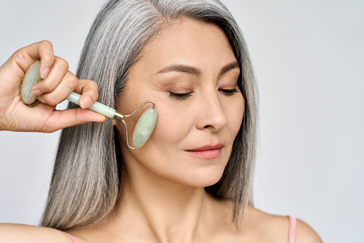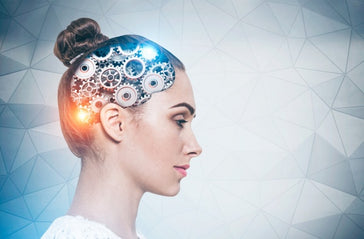Strategies To Fight Accelerated Brain Aging
Posted by Mike Miryala on

The brain — just like all organs — performs worse and gradually declines with age. That said, sometimes we feel that our basic brain functions and memory seem to be deteriorating faster as we age than it ought to. It’s known that as people get older, it is common for the brain to undergo changes such as slower processing speeds, trouble with multitasking or even occasionally forgetting appointments or difficulty finding words. But routine memory, skills and knowledge should be stable and even improve as we get older. Many people start noticing issues with their memory and brain performance by the time they get into their 50's and 60's. Some of these changes are a natural part of the aging process and are considered normal such as sometimes forgetting where you put your keys, or remembering an acquaintance’s name or slower to learn something new, while others may indicate more significant cognitive decline or the development of age-related neurological disorders.
Brain aging, while inevitable, affects each person differently. In this article, we will explore the factors that cause the brain to age faster than the body, as well as natural ways to boost memory, improve cognitive performance and keep your brain healthy as you grow older.
What is Brain Aging?

Brain aging refers to the changes that occur in the brain as a person grows older. These changes can include a decline in cognitive function, such as memory, attention, and decision-making, as well as structural and functional changes in the brain. Some of these changes are a normal part of the aging process, while others may be caused by various factors such as genetics, lifestyle, and environmental factors. Brain aging can have a significant impact on a person's quality of life, and may increase the risk of developing certain age-related neurological disorders.
What are the signs of Brain Aging?
Here are some common signs that may indicate your brain is aging:
- Memory problems: Momentary lapses of memory leading to forgetting things like appointments, names, and events, or having difficulty recalling information that was once familiar.
- Difficulty with multitasking: Finding it harder to focus on multiple things at once, or having trouble completing tasks that require multiple steps.
- Decreased processing speed: Having difficulty processing and responding to information as quickly as you used to.
- Decreased attention span: Finding it harder to concentrate for extended periods of time or getting distracted easily.
- Decreased problem-solving ability: Having difficulty with tasks that require reasoning or problem-solving skills.
- Changes in mood: Experiencing more anxiety, depression, or irritability than before.

It is important to note that not everyone will experience these changes in the same way, and some people may experience little to no cognitive decline as they age. If you are concerned about changes in your cognitive function or have any concerns about brain aging, it is recommended that you speak with a healthcare provider.
Does DNA Damage contribute to faster brain aging?
A major factor that drives a faster decline in cognitive function and overall brain health is DNA damage. DNA damage can occur due to a variety of factors, including exposure to toxins, radiation, and reactive oxygen species (ROS) generated during normal cellular metabolism. When DNA is damaged, it can lead to errors in gene expression and protein production, which can ultimately lead to cell death or dysfunction.
In the brain, DNA damage can contribute to a variety of age-related neurological disorders, including Alzheimer's disease and Parkinson's disease. Additionally, DNA damage can accelerate the aging process in the brain by reducing the number of functional neurons and increasing inflammation and oxidative stress. Studies have shown that DNA damage and repair mechanisms are critical factors in maintaining healthy brain function and preventing age-related cognitive decline.
There are several lifestyle factors that can contribute to DNA damage, including exposure to environmental toxins, poor diet, and lack of exercise. Additionally, NAD+ (nicotinamide adenine dinucleotide) is a coenzyme that plays an important role in cellular energy production and is involved in many cellular processes, including DNA repair. As we age, NAD+ levels tend to plummet, and we start feeling and showing the effects of this DNA Damage, including a weaker memory and slower brain performance.
One of the ways that NAD+ helps protect against DNA damage is by activating certain enzymes, called sirtuins, that are involved in DNA repair. Studies have shown that boosting NAD+ levels through supplementation with precursors like nicotinamide riboside (NR) can help increase sirtuin activity and promote DNA repair. Research has also suggested that NAD+ may help protect against oxidative stress, inflammation, and mitochondrial dysfunction, all of which are thought to play a role in brain aging.
Ways to Nourish Your Brain, Promote Cognitive Health and Help Slow Down Brain Aging

1. Exercise regularly and stay active.
Regular exercise has been shown to be one of the most effective ways to maintain and improve cognitive function. Exercise can help increase blood flow to the brain, reduce inflammation, and stimulate the growth of new brain cells.
2. Healthy Diet
A healthy diet that is rich in fruits, vegetables, whole grains, lean protein, and healthy fats can provide essential nutrients and antioxidants that can help protect against brain aging. Some examples of brain-healthy foods include blueberries, nuts and seeds, leafy greens, and fatty fish.
3. Keep your mind stimulated.
Engaging in mentally stimulating activities such as reading, learning a new language, problem-solving games or doing puzzles can help maintain and improve cognitive function. This is because mental stimulation can help increase brain connectivity and create new neural pathways.
4. Social engagement
Maintaining social connections and engaging in social activities can help improve cognitive function and reduce the risk of cognitive decline. This is because social engagement can help stimulate the brain, reduce stress, and provide emotional support.
5. Sleep well
Getting enough sleep is important for maintaining cognitive function and fighting brain aging. Lack of sleep can lead to cognitive impairment, memory problems, and mood disturbances.
6. Minimize stress
Stress is an unavoidable part of life. However, chronic stress can contribute to cognitive decline and accelerate brain aging. Practicing stress-reduction techniques such as meditation, deep breathing, or yoga can help reduce stress and improve cognitive function. Try to learn ways to cope with your personal stress and anxiety.
7. Maintaining good blood pressure and cholesterol levels
A healthy brain requires a good cardiovascular system. It is important to maintain healthy blood pressure and cholesterol levels through lifestyle modifications such as a healthy diet, regular exercise, and medications if needed, to help protect against brain aging and cognitive decline. If you have pre-existing cardiovascular conditions, consult and follow your doctor’s advice.
8. Avoid excess sugar in your diet
High sugar diets have been associated with a number of negative health effects, including inflammation, insulin resistance, and oxidative stress, all of which can contribute to brain aging and cognitive decline, not to mention the increased risk of developing type 2 diabetes which is a risk factor for dementia.
Therefore, reducing your sugar intake and consuming a diet that is rich in whole, nutrient-dense foods such as fruits, vegetables, lean proteins, and healthy fats can help protect against brain aging.
9. Take Brain-Supporting Supplements
Supplements to support brain health have been shown to help improve cognitive function and potentially slow brain aging. Here are a few examples:
- Omega-3 fatty acids: Maintaining sufficient levels of the omega-3 fatty acid DHA (docosahexaenoic acid) in the brain has been associated with a reduced risk of neurodegenerative diseases such as Alzheimer's disease and Parkinson's disease later in life. Research has suggested that DHA may help protect against neurodegeneration by reducing inflammation, promoting brain cell survival and growth to help protect against cognitive decline. It is usually found found in oily fish and some plant sources.
- Vitamin B12: Vitamin B12 is essential for brain function and nerve health. Studies have suggested that deficiency of vitamin B12 can be associated with poor memory, cognitive decline and brain shrinkage in older adults.
- Gingko biloba: Gingko biloba is an herbal supplement that has been used for centuries to improve cognitive function. Some studies have suggested that gingko biloba may help improve memory and attention in older adults.
- Curcumin: Curcumin is a compound found in turmeric that has anti-inflammatory and antioxidant properties. Studies have suggested that curcumin may help improve cognitive function and reduce the risk of developing Alzheimer's disease.
- Acetyl-L-carnitine: Acetyl-L-carnitine is an amino acid that is involved in energy metabolism in the brain. Some studies have suggested that acetyl-L-carnitine may help improve cognitive function in older adults.
It is important to note that while some brain-supporting supplements have shown promise in improving cognitive function, more research is needed to fully understand their effects and how they can be used as part of a comprehensive approach to healthy aging. Additionally, it is important to talk to a healthcare provider before starting any new supplements, as some may interact with medications or have other potential side effects.

Final Remarks
Brain aging is a natural process that occurs as we get older but each person is affected differently. Good news is that there are steps we can take to slow down the aging process, mitigate DNA damage and maintain a healthy brain. Regular exercise, a healthy diet, adequate sleep, stress management, avoiding exposure to environmental toxins, social engagement, and mental stimulation can all help to protect against accelerated brain aging and cognitive decline. Additionally, maintaining good blood pressure and cholesterol levels and avoiding a high sugar diet can also be beneficial.
Further, since your body’s ability to absorb vitamins decreases later in life, and vitamins are not always adequate or present in plant foods, adding brain-supporting supplements to your routine is wise. But it's always important to talk to your healthcare provider before taking any supplements.
It's never too early or too late to start taking care of your brain. For both young and older people, incorporating these healthy habits into your lifestyle can help you maintain a sharp mind as you age.
In addition to these healthy ways to take care and nourish your brain, the good news is that our bodies naturally have the ability to repair DNA damage that lead to premature brain aging. There's now a way to restore the high levels of NAD+ we had in our youth. NeuroRevive helps reverse the symptoms of brain aging with a carefully-developed science-based formula using ingredients clinically shown to support brain function. NeuroRevive works by helping to increase NAD+ levels, which is the key to fighting DNA Damage — which is now largely accepted as the true root cause of aging.
NeuroRevive is in capsule form so you can easily add this brain-boosting supplement to your routine.
- Contains Vitamin B6, B12 and Folate from NMN and 7 More Brain-Boosting Ingredients
- Increases NAD+
- Fights Neurodegeneration
- Improves Memory and Recall
- Elevates Neurotransmitters
Mike Miryala, Head Pharmacist at CoBionic
If you liked this article, here are supplements that you might be interested in:
Magnesium Glycinate
- 100% Vegan Capsules with Magnesium Glycinate clinically-proven to reduce stress and promote easy sleep
- Decreases blood pressure and leads to better heart health
- Helps regulate blood sugar and improves brain function
Turmeric Soothe
- Contains the Purest, Air-Dried Curcumin ... Plus a Patented Mechanism for Improved Absorption
- Turmeric has been used for centuries to alleviate inflammation, support digestion and boost the immune system









